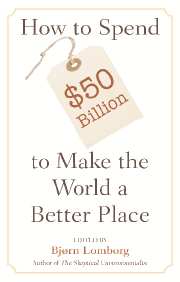Book contents
- Frontmatter
- Contents
- Contributors
- Introduction
- 1 Meeting the Challenge of Global Warming
- CLIMATE CHANGE – OPPONENTS' VIEWS
- 2 Communicable Diseases
- COMMUNICABLE DISEASES – OPPONENTS' VIEWS
- 3 The Challenge of Reducing the Global Incidence of Civil War
- THE CHALLENGE OF CONFLICTS – OPPONENTS' VIEWS
- 4 Toward a New Consensus for Addressing the Global Challenge of the Lack of Education
- THE CHALLENGE OF LACK OF EDUCATION – OPPONENTS' VIEWS
- 5 The Challenge of Poor Governance and Corruption
- THE CHALLENGE OF POOR GOVERNANCE AND CORRUPTION – OPPONENTS' VIEWS
- 6 Hunger and Malnutrition
- HUNGER AND MALNUTRITION – OPPONENTS' VIEWS
- 7 Population and Migration
- POPULATION: MIGRATION – OPPONENTS' VIEWS
- 8 The Water Challenge
- THE WATER CHALLENGE – OPPONENTS' VIEWS
- 9 Subsidies and Trade Barriers
- SUBSIDIES AND TRADE BARRIERS – OPPONENTS' VIEWS
- Expert Panel Ranking
- Index
9 - Subsidies and Trade Barriers
Published online by Cambridge University Press: 27 July 2009
- Frontmatter
- Contents
- Contributors
- Introduction
- 1 Meeting the Challenge of Global Warming
- CLIMATE CHANGE – OPPONENTS' VIEWS
- 2 Communicable Diseases
- COMMUNICABLE DISEASES – OPPONENTS' VIEWS
- 3 The Challenge of Reducing the Global Incidence of Civil War
- THE CHALLENGE OF CONFLICTS – OPPONENTS' VIEWS
- 4 Toward a New Consensus for Addressing the Global Challenge of the Lack of Education
- THE CHALLENGE OF LACK OF EDUCATION – OPPONENTS' VIEWS
- 5 The Challenge of Poor Governance and Corruption
- THE CHALLENGE OF POOR GOVERNANCE AND CORRUPTION – OPPONENTS' VIEWS
- 6 Hunger and Malnutrition
- HUNGER AND MALNUTRITION – OPPONENTS' VIEWS
- 7 Population and Migration
- POPULATION: MIGRATION – OPPONENTS' VIEWS
- 8 The Water Challenge
- THE WATER CHALLENGE – OPPONENTS' VIEWS
- 9 Subsidies and Trade Barriers
- SUBSIDIES AND TRADE BARRIERS – OPPONENTS' VIEWS
- Expert Panel Ranking
- Index
Summary
The challenge
Eliminating government subsidies and trade barriers has clear economic benefits. Despite evidence that those policies harm the economies that impose them, and are particularly harmful to the world's poor, governments continue to intervene in markets for both goods and services. This chapter argues that phasing out these trade-distorting policies should be the highest priority among the opportunities assessed. Not only would this strategy have a direct effect on poverty reduction, but there would also be indirect benefits across the full range of Copenhagen Consensus challenges. Moreover, the relatively small costs of adjustment to reform would leave plenty of the notional $50 billion to be spent on second priorities.
The most recent big surge of protectionism was about 75 years ago. Following the Second World War, governments of major industrial countries – well aware of the economic rationale for free trade – sought ways to reduce import tariffs. But politicians fear making changes that may be associated with politically unpopular redistributions of jobs, income, and wealth. The challenge therefore involves finding politically attractive ways to phase out the remaining distortions in world markets for goods, services, capital, and, potentially, even labor.
The arguments for and against removing subsidies and trade barriers
Free trade is often criticized by non-economists on the assumption that it has negative social and environmental consequences, as evidenced by the burgeoning “antiglobalization” movements.
- Type
- Chapter
- Information
- How to Spend $50 Billion to Make the World a Better Place , pp. 147 - 159Publisher: Cambridge University PressPrint publication year: 2006

